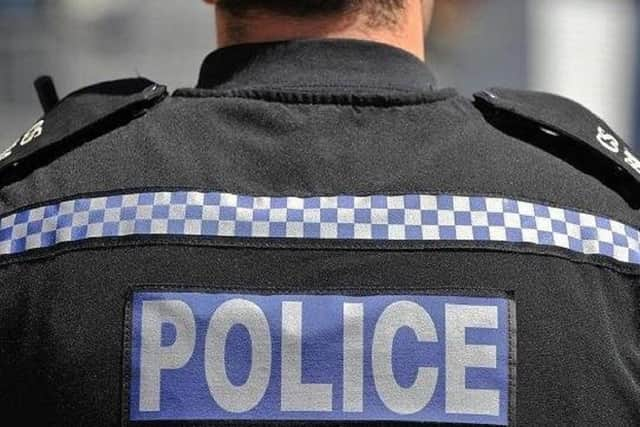Hertfordshire Police investigate hundreds of coercive control crimes during pandemic
and live on Freeview channel 276
Hertfordshire police investigated hundreds of allegations of coercive control in the first year of the coronavirus pandemic.
December marked the sixth anniversary of landmark legislation introduced to make coercive or controlling behaviour a criminal offence in England and Wales.
Advertisement
Hide AdAdvertisement
Hide AdBut only a "small minority of survivors" who experience such abuse will see justice done, according to charity Women's Aid.


Data published by the Office for National Statistics shows Hertfordshire Constabulary logged 334 allegations of coercive or controlling behaviour during 2020-21.
That was up from 237 the year before – and different figures suggest most cases will never reach a courtroom.
Of the 268 cases closed by the force in Hertfordshire during 2020-21, 93 per cent were abandoned due to difficulties gathering evidence while just 16 ended with a suspect being charged or summoned to court.
Advertisement
Hide AdAdvertisement
Hide AdWomen's Aid described coercive control, which is punishable by up to five years imprisonment, as a problem "at the heart of almost all domestic abuse".
Abusers can be jailed for subjecting a partner or family member to controlling behaviour such as isolating them, exploiting them financially, depriving them of basic needs, humiliating, frightening or threatening them.
Detective Chief Inspector Hannah Treadwell, who heads up the Domestic Abuse Investigation and Safeguarding Unit (DAISU) said: “Coercive and controlling behaviour is complicated with many victims not accepting that they are being abused or not actually able to report the abuse.
"The Criminal Prosecution Service (CPS) offers strict guidance to police for being able to charge for coercive and controlling behaviour and the majority of cases originally crimed quite often end up being minor disagreements and not coercive or controlling behaviour. All charging decisions have to be made by the CPS.
Advertisement
Hide AdAdvertisement
Hide Ad"We also receive a large number of historic reports, so we are unable to use the 2015 legislation, but we have to crime the report. We will of course fully investigate these cases and work with our partners.
"Coercive and controlling behaviour is not usually in isolation – we are often dealing with other offences, including assaults, ABH and GBH and safeguarding children.
"Safeguarding victims remains our top priority. Sometimes, for many reasons including evidential difficulties, we are unable to get the offender to court.
"However, we have secured many successful prosecutions for coercive and controlling behaviour, some even without the support of the victim.
Advertisement
Hide AdAdvertisement
Hide Ad“We have a specialist team of officers working in our Domestic Abuse Investigation and Safeguarding Unit (DAISU) who have helped thousands of domestic abuse victims, many suffering from coercive and controlling behaviour, by offering practical help and advice and working with partner agencies to re-house victims or obtain non-molestation order or restraining orders.
"We continue to pursue evidence-led prosecutions and remain in a strong position for our domestic abuse criminal justice outcomes.
"All testament to the joined-up approach of the domestic abuse partnership (led by Hertfordshire County council) and the Force’s DAISU.
“We would urge anyone with concerns about their partner to contact us however you can also access support independently of the police through the Independent Domestic Abuse Advisor services by calling 0300 790 6772.
Advertisement
Hide AdAdvertisement
Hide Ad"In an emergency, always call 999. If you are afraid or unable to speak, call 999 from a mobile and press 5, 5.”
Some examples of convictions in Hertfordshire in 2021 (ages at time of conviction):
> Rodo Marcin, aged 42, from Hatfield received three years imprisonment.
> Alan Tippett, aged 52, from Hitchin received four years and three months imprisonment.
Advertisement
Hide AdAdvertisement
Hide Ad> Darryl Harding, age 53, from Welwyn Garden City received 8.5 years in prison for GBH as well.
> Damon Whitcombe, 37, from Hatfield received four years and three months imprisonment.
During the first year of the pandemic, 34,000 allegations were reported to forces across England and Wales, with the number of recorded crimes rising by more than a third compared to around 25,000 in 2019-20, though data for that year excludes Greater Manchester Police.
Home Office figures show more than nine in 10 investigations closed nationally in 2020-21 were dropped due to evidential difficulties, while just 4 per cent resulted in a charge or summons being issued.
Advertisement
Hide AdAdvertisement
Hide AdIn some cases, prosecutors and investigators may close a coercive control investigation but continue to pursue other offences linked to the case.
Isabelle Younane, head of policy, campaigns and public affairs at Women's Aid, called for consistency between forces and said it is vital all police officers and prosecutors understand the nature and "damaging, lifelong impact" of coercive control.
She added: “Survivors need, and deserve, a consistent response to their experiences of abuse."
"It is a matter of urgency for the Government to invest in multi-agency and partnership working across services."
Advertisement
Hide AdAdvertisement
Hide AdA spokesman for the National Police Chiefs' Council said the response to the complex problem had improved in recent years but acknowledged the need for better understanding across the justice system.
He said officers sought to safeguard victims and build cases where reported incidents meet the requirements to be considered a crime but not the threshold for arrest or prosecution.
A Home Office spokeswoman said the Government is acting to tackle the "particularly insidious" form of domestic abuse and will publish its Domestic Abuse Strategy this year.
She said police forces are expected to take allegations seriously, adding: "The increase in reporting of these crimes shows the improvements the police have made, with victims more willing to come forward."
